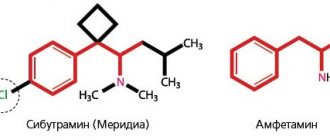It is difficult to lose a large number of extra pounds with diets and exercise. Orlistat is a drug that helps burn fat reserves. Find out how to take it to lose weight without fasting or working out!
- Reviews from customers and doctors
Author: Kristina Lobanovskaya, doctor, practicing nutritionist Article updated: 11/10/2020
Ask a Question
While manufacturers of dietary supplements for weight loss praise the effectiveness of their products, doctors recommend losing weight with the help of lipid-lowering drugs. Orlistat is considered one of the most effective in this group. What beneficial properties does the product have for losing weight and is it worth expecting rapid results?
Pharmacological properties
According to its pharmacological group, orlistat is an inhibitor of gastrointestinal lipases, which means that it temporarily blocks the activity of a special enzyme that is designed to break down fats from food. It acts in the lumen of the stomach and small intestine.
The effect is that undigested fats cannot be absorbed into the mucous walls, and fewer calories enter the body, which leads to weight loss. Orlistat practically does not enter the central bloodstream; it is detected in the blood in extremely rare cases and in very low doses, which cannot lead to systemic side effects.
Clinical evidence indicates that glycemic control improves in obese people with type 2 diabetes. In addition, while taking orlistat, the following were observed:
- reducing the dosage of hypoglycemic agents;
- decrease in the concentration of insulin drugs;
- reduction of insulin resistance.
A 4-year study found that obese people at risk of developing type 2 diabetes had a reduced risk of developing type 2 diabetes by about 37%.
The effect of orlistat begins 1-2 days after the first dose, which is understandable based on the fat content in the feces. Body weight loss begins after 2 weeks of constant use and continues for up to 6-12 months, even in those people who practically did not lose weight on special diets.
The drug does not provoke weight gain again after stopping treatment. It completely stops having its effect approximately 4-5 days after taking the last capsule.
Mechanism of action and effectiveness
The substance orlistat was first synthesized in the mid-80s by Swiss biochemists. Its main property is inhibition of gastrointestinal lipase (an enzyme that breaks down fats). As a result, the breakdown of fats into fatty acids and monoglycerides becomes impossible.
Unlike most advertised dietary supplements, the drug actually works with lipid metabolism.
Since fats are no longer absorbed into the blood during Orlistat use, creating a calorie deficit, the body begins to use its own fat reserves as an energy source. According to numerous clinical studies, a therapeutic dose of the substance can block up to 30% of dietary fat.
Important! Orlistat is the only substance officially approved for use in the long-term treatment of obesity. It was once available in all countries only by prescription. This law still exists in Canada today. In Russia, patients also cannot make over-the-counter purchases. Some pharmacies are ready to sell the product over the counter, but only if the dosage of the active substance does not exceed 60 mg.
As a bonus, the drug reduces the level of “bad” cholesterol, provides control over blood pressure and prevents the development of type 2 diabetes. Doctors say that regular treatment of excess weight through drugs with orlistat forms a conditioned reflex in a person: as soon as overeating occurs, diarrhea is observed. However, this moment does not affect the general well-being. Since the substance does not penetrate into the blood, systemic effects on the body can be avoided. Metabolism of the drug is observed in the intestinal walls. It completely leaves the body after a few days.
Long-term therapy with Orlistat allows you to lose weight without going beyond dietary standards - up to approximately 8 kg in 3 months.
The World Organization of Gastroenterology considers orlistat medicinal products to be moderately effective in treating obesity. This is confirmed by test results:
- In 3 months, the volunteers managed to lose up to 5% of their original weight.
- Significant weight loss was observed in more than 70% of patients.
However, you can find quite a few reviews online about the drug containing orlistat that dispute its effectiveness. Some claim that in six months it is possible to get rid of a maximum of 10% of weight, and only in the case when a strict diet is followed at the same time and intense physical activity occurs. There is another opinion - after completing the course, the lost kilograms return. Doctors confirm the veracity of these words, recommending not to give up a healthy diet after completing medical weight loss.
Indications and contraindications
Orlistat should not be used alone by healthy people, especially those of normal weight! It is intended for the treatment of obesity.
Indications:
- Long-term treatment for overweight people whose BMI is more than 30.
- Treatment of patients who have a BMI greater than 28 and have risk factors that lead to obesity.
- Treatment of people with type 2 diabetes and obesity who are taking oral hypoglycemic drugs and/or insulin.
Situations in which taking orlistat is prohibited or limited:
- Hypersensitivity to any of the components.
- Age up to 12 years.
- Pregnancy and lactation period.
- Impaired absorption of nutrients in the small intestine.
- Problems with the formation and excretion of bile, due to which it enters the duodenum in smaller quantities.
- Simultaneous use with cyclosporine, warfarin and some other drugs.
Although the results of animal studies did not reveal a negative effect of orlistat on the fetus, pregnant women are prohibited from using this drug. The likelihood of the active substance entering breast milk has not been established, therefore, lactation must be completed during the course of treatment.
Similar drugs:
- Xenical Aerosol
- Orsoten Granules for oral suspension
- Orsoten Capsule
** The Drug Directory is intended for informational purposes only. For more complete information, please refer to the manufacturer's instructions. Do not self-medicate; Before starting to use Orlistat, you should consult a doctor. EUROLAB is not responsible for the consequences caused by the use of information posted on the portal. Any information on the site does not replace medical advice and cannot serve as a guarantee of the positive effect of the drug.
Are you interested in the drug Orlistat? Do you want to know more detailed information or do you need a doctor's examination? Or do you need an inspection? You can make an appointment with a doctor - the Euro lab is always at your service! The best doctors will examine you, advise you, provide the necessary assistance and make a diagnosis. You can also call a doctor at home . Euro lab clinic is open for you around the clock.
** Attention! The information presented in this medication guide is intended for medical professionals and should not be used as a basis for self-medication. The description of the drug Orlistat is provided for informational purposes and is not intended for prescribing treatment without the participation of a doctor. Patients need to consult a specialist!
If you are interested in any other drugs and medications, their descriptions and instructions for use, information about the composition and form of release, indications for use and side effects, methods of use, prices and reviews of drugs, or you have any other questions and suggestions - write to us, we will definitely try to help you.
Instructions for use
There are capsules of 60 and 120 mg. Doctors usually prescribe a dosage of 120, because it works better for obesity.
The drug should be taken 1 capsule with each main meal (this means full breakfasts, lunches and dinners, and not light snacks). Orlistat is taken immediately before, during, or no later than an hour after meals. If the food did not contain fat, you can skip the medication.
During the course, you should follow a low-calorie diet and distribute proteins, fats and carbohydrates equally at each meal, but fats should not exceed 30% of the total daily diet.
The general recommended dosage regimen is 120 mg 3 times a day. The attending physician can adjust the frequency of administration and dose at his own discretion. The course of treatment with orlistat is determined individually, but usually lasts at least 3 months, because only during this time can one understand how well the drug copes with its task.
Substance-powder Orlistat (Orlistat)
Instructions for medical use of the drug
Description of pharmacological action
Lipase inhibitor. When taken orally, orlistat inhibits gastric and pancreatic lipases. As a result, the breakdown of dietary fats is disrupted and their absorption from the gastrointestinal tract is reduced. When used systematically, this effect leads to a decrease in body weight in obese patients. Orlistat is practically not absorbed from the gastrointestinal tract and therefore has virtually no resorptive effect.
Indications for use
According to the Physician Desk Reference (2009), orlistat is indicated for the treatment of obesity, incl. reducing and maintaining body weight, in combination with a hypocaloric diet. Orlistat is also indicated to reduce the risk of weight regain following initial weight loss. Orlistat is indicated for obese patients with a body mass index ≥30 kg/m2 or ≥27 kg/m2 in the presence of other risk factors (diabetes mellitus, hypertension, dyslipidemia).
Release form
powder substance; PVC bag 12.5 kg aluminum foil bag (bag) 1 thermal container 1; powder substance; PVC bag 12.5 kg aluminum foil bag (bag) 1 thermal container 1;
Pharmacodynamics
Lipase inhibitor. When taken orally, orlistat inhibits gastric and pancreatic lipases. As a result, the breakdown of dietary fats is disrupted and their absorption from the gastrointestinal tract is reduced. When used systematically, this effect leads to a decrease in body weight in obese patients. Orlistat is practically not absorbed from the gastrointestinal tract and therefore has virtually no resorptive effect.
Use during pregnancy
Orlistat is used with extreme caution during pregnancy and lactation.
Contraindications for use
Chronic malabsorption syndrome, hypersensitivity to orlistat.
Side effects
Possible: oily discharge from the rectum, flatulence, “greasy” stools, frequent bowel movements, urgency to defecate, fecal incontinence.
Directions for use and doses
Take 120 mg orally with each main meal or within an hour after meals, usually no more than 3 times a day. If your meal is low in fat, you can skip orlistat.
Interactions with other drugs
It has been shown that orlistat leads to a decrease in the absorption of beta-carotene and α-tocopherol from the gastrointestinal tract.
Precautions for use
Before prescribing orlistat, an organic cause of obesity, such as hypothyroidism, should be excluded. During treatment, a balanced low-calorie diet is recommended, in which fats provide no more than 30% of calories. The likelihood of developing side effects from the gastrointestinal tract increases with high fat content in food (more than 30% of daily calories). The daily intake of fats, carbohydrates and proteins should be distributed between three main meals. Because orlistat reduces the absorption of some fat-soluble vitamins, patients should take a multivitamin containing fat-soluble vitamins to ensure adequate intake. In addition, vitamin D and beta-carotene levels may be lower in obese patients than in non-obese individuals. Multivitamins should be taken 2 hours before or 2 hours after taking orlistat, for example at bedtime. Taking orlistat in doses exceeding 120 mg 3 times a day does not provide additional effect. In patients taking orlistat and cyclosporine concomitantly, more frequent monitoring of cyclosporine plasma levels is required. In patients who did not receive prophylactic vitamin supplements, at two or more consecutive visits to the doctor during the first and second years of treatment with orlistat, a decrease in plasma vitamin levels was recorded in the following percentage of cases (data in the placebo group are indicated in parentheses): vitamin A 2, 2% (1%), vitamin D 12.0% (6.6%), vitamin E 5.8% (1%), beta-carotene 6.1% (1.7%). In some patients, urinary oxalate levels may increase with orlistat. As with other weight loss medications, orlistat may be abused in some groups of patients (such as anorexia nervosa or bulimia). Induction of weight loss by orlistat may be combined with improved metabolic control of diabetes mellitus, which will require a reduction in doses of oral hypoglycemic agents (sulfonylurea derivatives, metformin, etc.) or insulin.
Special instructions for use
It must be borne in mind that the frequency and severity of side effects increase with increasing fat content in food. By reducing the fat content in food, the likelihood of side effects decreases. It is recommended that the amount of fat consumed per day be distributed fairly evenly across all meals. During treatment, as body weight decreases, it is possible to improve the course of pathological processes that often accompany obesity, incl. arterial hypertension, diabetes mellitus, lipid metabolism disorders.
Storage conditions
Store out of the reach of children, in a dry, dark place, out of the reach of children, at a temperature not exceeding 25 0C.
Best before date
48 months
Overdose and side effects
Experiments have been conducted with the use of large dosages of Orlistat over a long period of time, and no systemic side effects have been identified. Even if an overdose suddenly manifests itself, its symptoms will be similar to ordinary undesirable effects, which are fleeting.
Sometimes complications arise that are reversible:
- From the gastrointestinal tract. Abdominal pain, flatulence, diarrhea, frequent trips to the toilet. The most unpleasant ones are: the release of undigested fat from the rectum at any time, the passage of gases with a small amount of feces, and fecal incontinence. Sometimes there is damage to the gums and teeth.
- Infectious diseases. Observed: influenza, infections of the lower and upper respiratory tract, urinary tract.
- Metabolism. A decrease in blood glucose concentration below 3.5 mmol/l.
- From the psyche and nervous system. Headaches and anxiety.
- From the reproductive system. Irregular cycle.
Disturbances from the stomach and intestines increase in proportion to the increase in fatty foods in the diet. They can be controlled with a special low-fat diet.
All described side effects are short-term and occur rarely, usually only at the beginning of treatment (in the first 3 months).
After the release of the original orlistat on the pharmaceutical market, the following registered complaints of complications began to be received:
- rectal bleeding;
- itching and rash;
- deposition of oxalic acid salts in the kidneys, which led to renal failure;
- pancreatitis.
The frequency of these side effects is unknown; they could have been one-time events or even not directly related to the drug, but the manufacturer had to register them in the instructions.
special instructions
Before starting treatment with Orlistat, you must tell your doctor about all medications you are taking on an ongoing basis. Some of them may not be compatible with each other. These include:
- Cyclosporine. Orlistat reduces its concentration in the blood, which leads to a decrease in the immunosuppressive effect, which can have a dramatic negative impact on health. If it is necessary to take both drugs at the same time, monitor the level of cyclosporine using laboratory tests.
- Antiepileptic drugs. When they were taken simultaneously, convulsions were sometimes observed, although a direct connection between them was not identified.
- Warfarin and similar drugs. The content of blood protein, which is involved in blood clotting, may decrease, which sometimes changes laboratory blood values.
- Fat-soluble vitamins (E, D and β-carotene). Their absorption decreases, which is directly related to the effect of the drug. It is recommended to take such medications at night or 2 hours after the last dose of Orlistat.
The course of treatment with the drug should be stopped if after 12 weeks of use the weight has decreased by less than 5% of the original weight. Weight loss may occur more slowly in people with type 2 diabetes.
When taken with metformin/insulin and combined with a low-calorie diet, carbohydrate metabolism improves, which may require a reduction in the dosage of hypoglycemic drugs.
Women who take tablet contraceptives should be warned that if frequent loose stools occur during the course of treatment with Orlistat, additional barrier protection is required, since the effect of hormonal drugs against this background is reduced.
Orlistat analogs
The original drug is Xenical. It was created by a Swiss pharmaceutical company at the end of the 20th century. Over 4 thousand people took part in clinical trials.
Its other analogues:
- Orliksen;
- Orsoten;
- Listata;
- Xenalten.
Some manufacturing companies produce drugs under the name of the active substance: Akrikhin, Atoll, Kanonpharma, Polpharma, etc. Almost all drugs based on orlistat are prescription drugs, with the exception of Orsoten Slim, which contains 60 mg of the active substance.
Other drugs for weight loss and treatment of type 2 diabetes
| Name | Active substance | Pharmacotherapeutic group |
| Lyxumia | Lixisenatide | Antihyperglycemic drugs (treatment of type 2 diabetes) |
| Glucophage | Metformin | |
| New norm | Repaglinide | |
| Victoza | Liraglutide | |
| Forxiga | Dapaliflozin | |
| Goldline | Sibutramine | Appetite regulators (obesity treatment) |
Review of drugs for weight loss:
Guide to choosing medications. Anti-obesity pills. Health. (12/18/2016)
Composition and release form
Orlistat (Orlistat, Orlistatum) is a drug of the hypolipidemic group containing the active substance of the same name. On the shelves of Russian pharmacies you can often find a drug from two manufacturers - Akrikhin (Poland) and Canon (Russia). The concentration of the active substance in both cases is 120 mg. The medicine is available in the form of capsules with a light crystalline powder inside. Auxiliary components are microcrystalline cellulose, talc, sodium starch glycolate, etc. You can also find a product produced in the UK, USA, Germany, China and India in pharmacies.
Medicines with orlistat as an active substance are also produced under other trade names: Orsoten and Orsoten Slim, Xenical, Alli, Orlimax. Such medicinal products can be considered synonyms or analogues.
Price in pharmacies
The cost of orlistat depends on the dosage (60 and 120 mg) and capsule packaging (21, 42 and 84).
| Trade name | price, rub. |
| Xenical | From 935 to 3,900 |
| Orlistat Akrikhin | From 560 to 1,970 |
| Listata | From 809 to 2377 |
| Orsoten | From 880 to 2,335 |
These drugs should only be prescribed by a doctor and only after diet therapy and exercise have not given the desired result. They are not recommended for ordinary people without health problems.








